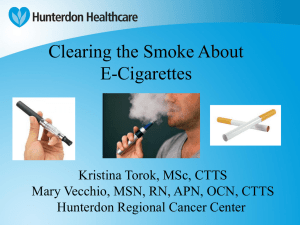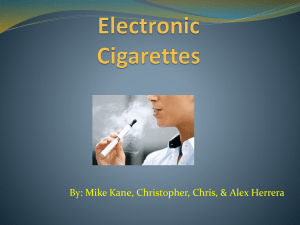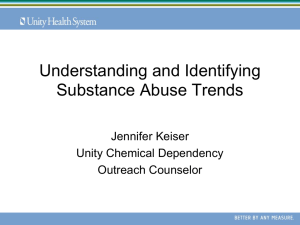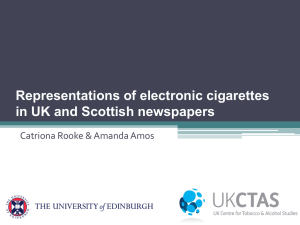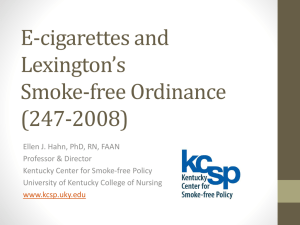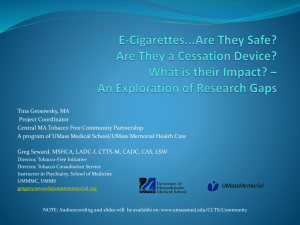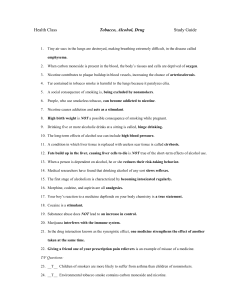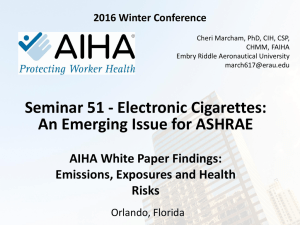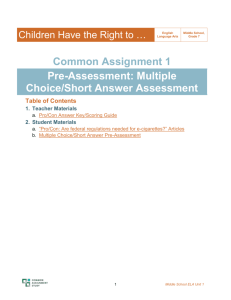Argument Essay 1 - Moore Public Schools
advertisement
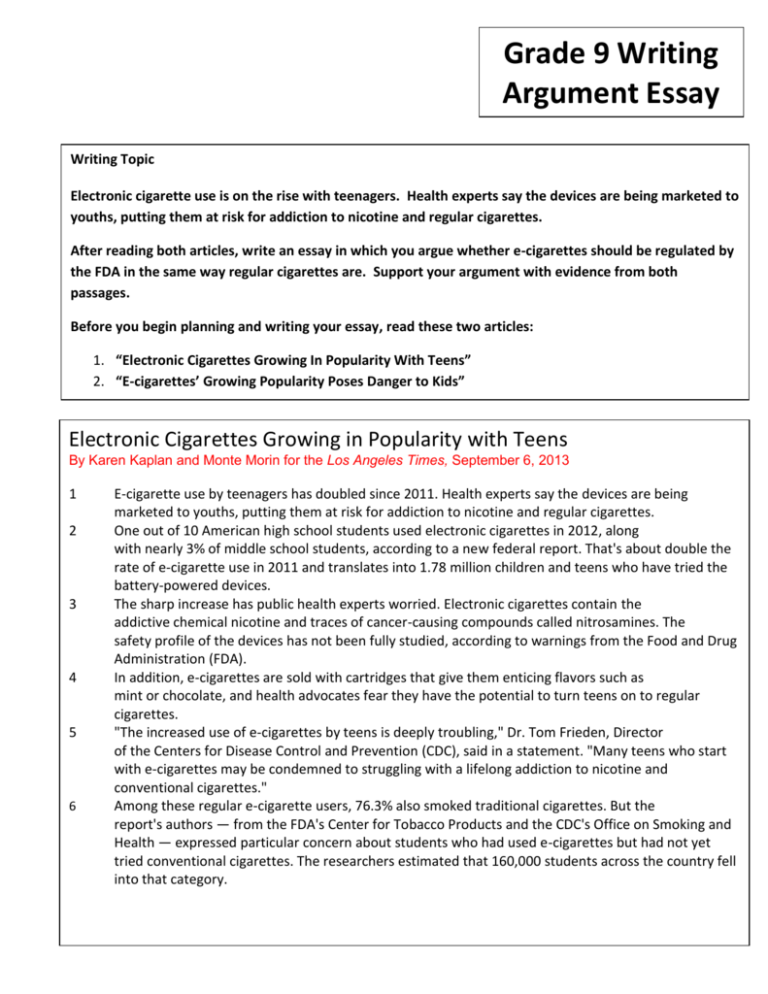
Grade 9 Writing Argument Essay Writing Topic Electronic cigarette use is on the rise with teenagers. Health experts say the devices are being marketed to youths, putting them at risk for addiction to nicotine and regular cigarettes. After reading both articles, write an essay in which you argue whether e-cigarettes should be regulated by the FDA in the same way regular cigarettes are. Support your argument with evidence from both passages. Before you begin planning and writing your essay, read these two articles: 1. “Electronic Cigarettes Growing In Popularity With Teens” 2. “E-cigarettes’ Growing Popularity Poses Danger to Kids” Electronic Cigarettes Growing in Popularity with Teens By Karen Kaplan and Monte Morin for the Los Angeles Times, September 6, 2013 1 2 3 4 5 6 E-cigarette use by teenagers has doubled since 2011. Health experts say the devices are being marketed to youths, putting them at risk for addiction to nicotine and regular cigarettes. One out of 10 American high school students used electronic cigarettes in 2012, along with nearly 3% of middle school students, according to a new federal report. That's about double the rate of e-cigarette use in 2011 and translates into 1.78 million children and teens who have tried the battery-powered devices. The sharp increase has public health experts worried. Electronic cigarettes contain the addictive chemical nicotine and traces of cancer-causing compounds called nitrosamines. The safety profile of the devices has not been fully studied, according to warnings from the Food and Drug Administration (FDA). In addition, e-cigarettes are sold with cartridges that give them enticing flavors such as mint or chocolate, and health advocates fear they have the potential to turn teens on to regular cigarettes. "The increased use of e-cigarettes by teens is deeply troubling," Dr. Tom Frieden, Director of the Centers for Disease Control and Prevention (CDC), said in a statement. "Many teens who start with e-cigarettes may be condemned to struggling with a lifelong addiction to nicotine and conventional cigarettes." Among these regular e-cigarette users, 76.3% also smoked traditional cigarettes. But the report's authors — from the FDA's Center for Tobacco Products and the CDC's Office on Smoking and Health — expressed particular concern about students who had used e-cigarettes but had not yet tried conventional cigarettes. The researchers estimated that 160,000 students across the country fell into that category. 7 8 9 10 11 12 13 14 15 16 17 18 "The risk for nicotine addiction and initiation of the use of conventional cigarettes or other tobacco products" among these students is a "serious concern," they wrote. Cigarette smoking is responsible for more than 440,000 deaths each year, including 49,400 due to secondhand smoke, according to the CDC. Tobacco use is the No. 1 cause of preventable death in the U.S., and it contributes to cancers of the lung and other organs, cardiovascular disease and respiratory ailments. Electronic cigarettes are not regulated by the FDA, though the agency has said it plans to bring them under its jurisdiction. The American Lung Assn. has been a consistent advocate for FDA regulation of e-cigarettes. "When you see cotton candy, bubble gum and atomic fireball flavors, there's no question these products are being marketed directly at kids," said Erika Sward, the group's Vice President for National Advocacy. "I think this data really shows our concerns are real." E-cigarette manufacturers insist that they are not marketing the devices to minors. Tom Kiklas, the Chief Financial Officer of the Tobacco Vapor Electronic Cigarette Assn., said a federal appeals court ruled in 2010 that e-cigarettes were not medical devices and should instead be considered tobacco products. As such, their sale to minors is prohibited by law, and it's the responsibility of retailers to ensure that buyers are of legal age, he said. "Kids aren't supposed to be buying any tobacco product," Kiklas said. The American Thoracic Society, like the American Lung Assn., has criticized e-cigarette manufacturers for marketing their products as a means to help people quit smoking. "These products are not approved by the FDA as smoking cessation devices," said society spokesman Gary Ewart. If the FDA intends to restrict access to e-cigarettes before they take off with consumers, it's probably too late. One tobacco industry analyst from Wells Fargo Securities predicts Americans will spend $1.7 billion on e-cigarettes this year. That means public health authorities should get busy, according to the authors of the new study. "Given the rapid increase in use and youths' susceptibility to social and environmental influences to use tobacco, developing strategies to prevent marketing, sales, and use of e-cigarettes among youths is critical," they wrote. E-cigarettes' Growing Popularity Poses Danger to Kids Laura Ungar, The (Louisville, Ky.) Courier-Journal 6 a.m. EST January 5, 2014 Scientists are raising concerns about the effects of e-cigarettes' "secondhand vapor" on children. Story Highlights 1 Poisonings from liquid nicotine increasing across nation Federal government does not ban sale to minors Proponents say e-cigarettes can help adults stop smoking LOUISVILLE, Ky. -- Billed as a safer, cleaner way to get a nicotine fix, electronic cigarettes are surging in popularity. But some doctors and researchers say these smoking substitutes are far from harmless — especially to children. More teens are trying these products, even as scientists increasingly raise concerns about the effects of e-cigarettes' "secondhand vapor" on children. In addition, the liquid nicotine used in the devices, which comes in flavors such as bubblegum and cola, is being blamed for a growing number of poisonings across the nation. 2 3 4 5 6 7 8 9 10 11 12 "Accidental exposure by children to e-cigarettes is a public health concern that we need to take seriously," said LaQuandra Nesbitt, Director of the Louisville Metro Department of Public Health and Wellness, which will soon recommend age restrictions on the devices. "Parents need to be aware of the potential dangers to their children." The battery-operated units contain cartridges filled with nicotine, flavor and other chemicals, which are heated to create a vapor inhaled by the user. Starter kits can cost $60-$80, five-packs of cartridges can run around $10, and sales of e-cigarettes have doubled to more than $1.5 billion in the past year. But problems among children also have risen. Ashley Webb, Director of the Kentucky Regional Poison Control Center of Kosair Children's Hospital, said the center received more than 40 calls involving e-cigarette poisonings in 2013, up from nine in 2012 and one in 2010. Nationally, there were 427 such exposures in 2012, according to the latest annual report from the National Poison Data System. Meanwhile, the 2012 National Youth Tobacco Survey shows that recent e-cigarette use nearly doubled in one year among U.S. high school students, rising from 1.5% in 2011 to 2.8% smoking them in 2012. While Indiana prohibits sales of e-cigarettes to minors, Kentucky and the federal government do not. But a soon-to-be-released report from the Louisville Health Department recommends restricting the sale of e-cigarettes to Jefferson County minors. The U.S. Food and Drug Administration is also considering whether to regulate e-cigarettes. The agency issued a warning in 2009 that the devices were being marketed to youth, but does not regulate the products unless they make therapeutic claims. "It's really up to individual store owners not to sell to children," said Troy LeBlanc, owner of Derb E Cigs in Jeffersontown, who won't sell to anyone younger than 18. "I wouldn't be opposed to government age restrictions." LeBlanc said e-cigarettes can be beneficial for adults, helping them quit tobacco smoking, which is documented to be more dangerous. Ray Story, Chief Executive Officer of the Tobacco Vapor Electronic Cigarette Association, agreed they're an effective smoking substitute, saying the industry designs and markets the devices for adults. He said the vapor is harmless, and it's up to adults to keep children from the e-liquid, which can sicken them. "At the end of the day, everything's attractive to kids," Story said. "If you're an adult, it's a matter of choice. But we have to safeguard those who don't have the ability to safeguard themselves." Webb said parents often don't think of nicotine as a poison, so they may leave liquid e-cigarette cartridges within reach of children. The warning label on the e-cigarette fluid states, "Must be 18 years or older to purchase, contains nicotine," and "Keep out of children's reach." Children are getting ahold of e-cigarettes and taking them apart, she said. "They either ingest the liquid or get it onto their skin. Even on the skin, the nicotine is absorbed." She said toddlers and preschoolers sometimes lick the containers or drink the liquid, enticed by the flavoring. "Kids will eat most anything," said George Rodgers, Associate Medical Director of the Poison Control Center. Ingesting e-liquid can give children a harmful or even deadly dose of nicotine. Rodgers said many cartridges contain more than 14 milligrams, enough to cause harm. "And since children are not used to consuming nicotine, their symptoms may be more severe at lower levels," he said. Symptoms include hyperactivity, flushing, sweating, headache, dizziness, rapid heart rate, vomiting and diarrhea. Even small amounts on a child's skin can cause irritation and a burning sensation. In very severe cases, a child's heart rate and blood pressure may drop dangerously low, resulting in a coma or even death. 13 14 15 Webb said there have been no deaths so far among cases her center has handled, but children have ended up in the emergency room. Story said his organization has pushed for safety packaging, and e-liquid refills come with tamperevident caps. LeBlanc said some of his products now come with child-resistant caps, and "we're transferring everything to child-resistant." "All of our liquids have a warning on them to keep out of the reach of children," he added. Jenny Haliski, an FDA spokeswoman, said federal regulations now apply only to conventional cigarettes and other tobacco products, but her agency is considering new rules that may cover ecigarettes. Stephen Wright, Kosair Hospital's Medical Director, said people should be cautious. "Since the industry is still so new, we don't yet know all of the long-term health effects of ecigarettes to the user, in addition to any effects of secondhand vapor," he said. "We do know that not smoking anything — especially around children — is always the best bet."
